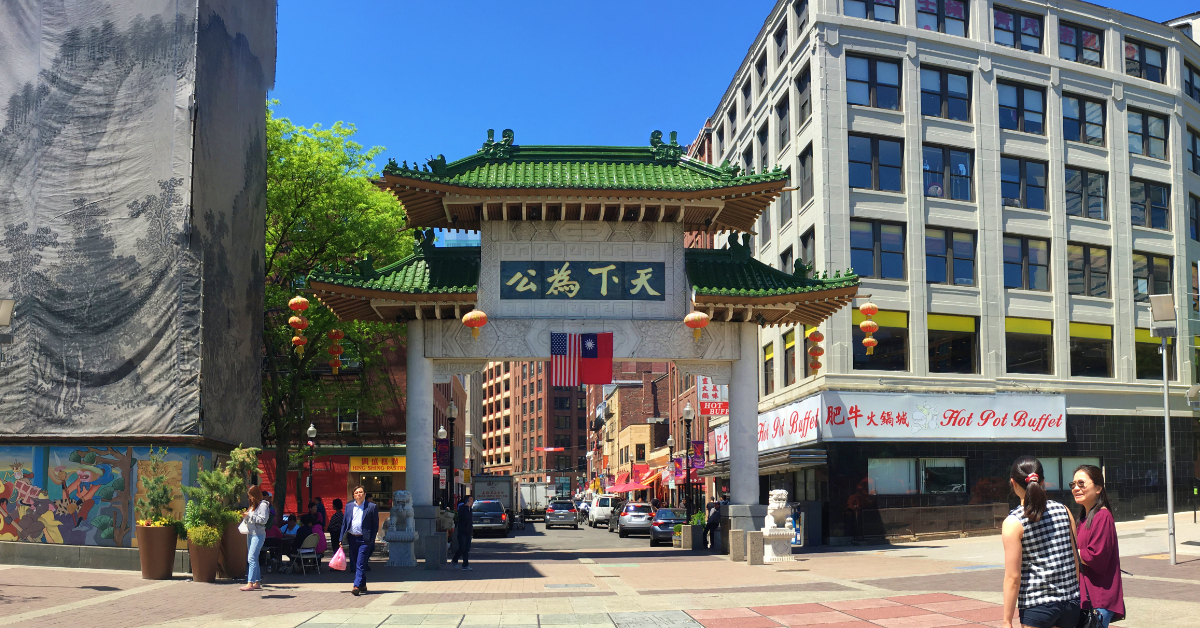Boston Chinatown Gate
Fun Facts about the Chinatown Gate
Boston's Chinatown is the third largest in the United States, and just as most are, there is a decorative gate at its entrance.
The Chinatown Gate was offered by the Taiwanese government to the City. The gate is engraved with two writings in Chinese: Tian Xia Wei Gong, a saying attributed to Sun Yat-sen that translates as "everything under the sky is for the people", and Li Yi Lian Chi, the four societal bonds of propriety, justice, integrity and honor.

Fun Facts about Boston Chinatown Gate
In 1974, China gave the Gate to the City of Boston as the gift for the United States Centennial Celebration.
It took seven years to figure out how to pay for the installation. In 1975, the City of Boston created the Edward Ingersoll Browne Fund to direct spending on various city art projects.
Ground breaking was on June 7, 1981.
When the gate was placed, the entrance onto Beach Street was closed off from car traffic. This was to reduce the congestion from the Expressway into Chinatown. The street was re-open during the construction of the Big Dig, which caused issues with trucks knocking down the lions.
There is a lion, otherwise known as Foo Dogs, on both sides of the Arch - each weighing a ton.
The Chinatown Gate Arch is 30-feet high
The words on top of the gate mean, "A World Shared By All" - It's the same phrase that's on the Chicago Chinatown Gate and the Chinatown Gate in San Francisco. In Chicago, the translation is "The World Belongs to the Commonwealth." This was a common saying in the early 1900s.
Rededicated October 1990
Taipei, Capital of Taiwan, is Boston Sister city since 1996.
The Chinatown Gate installation was officially funded by the Edward Ingersoll Browne Fund.
Foo Dogs Controversy
At one time there were four Foo Dogs in front of the Chinatown gate.
During the construction of the Big Dig, sometime between 1991 and 2007, the Foo statues, were replaced with replicas.
Two of the originals were placed in a private home in Lexington. The home was owned by Paul Pedini, a former vice president of Modern Continental. The other two were placed in front of the Kowloon restaurant in Saugus.
Paul Pedini claimed that the original Foo dogs were not needed anymore and initial plans indicated that they were going to be destroyed because they were damaged. He had two of them placed in the rooftop garden of a 2.2 million dollar home he was building in Lexington.
Once public, via a Boston Herald story, the City of Boston has asked for all the Foo Dogs to be returned.
Paul Pedini returned the two statues. Kowloon has declined to return there's saying that it was a gift by the Chinatown elders.
The statues in front of the gate are still the replicas. The city hasn't decided what to do with the originals that they have. There has been some suggestion to place them in the Boston's Mount Hope Cemetery.
The replicas cost the city $4,800 each. The original ones were part of the entire gate package estimated to cost between $400,000 to $500,000.
Getting to Chinatown Gate
Chinatown Gate is located at the intersection of Beach Street and Hudson Street. The best way to get there is to take the Red Line to South Station and walk to Beach Street.
